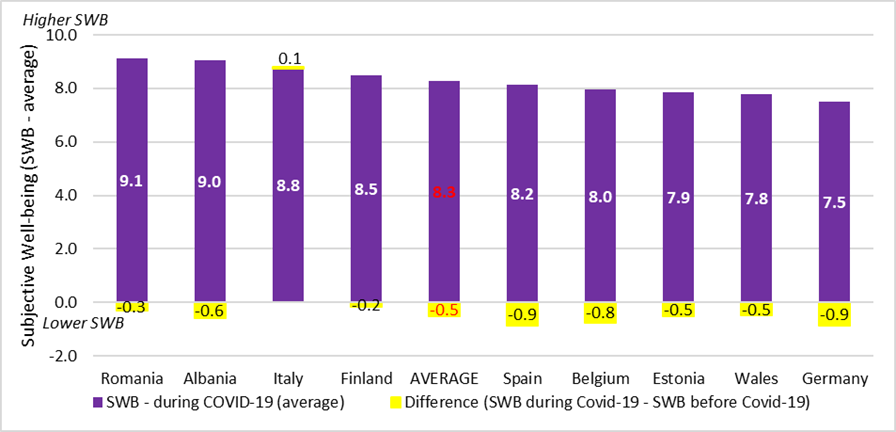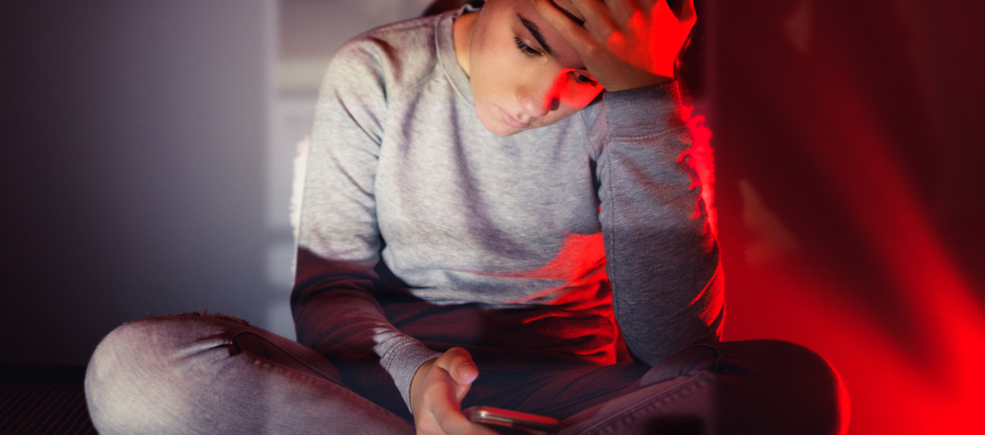In my previous Children’s Worlds project blog posts, we looked at the impact of the pandemic on Welsh children’s well-being in relation to school and whether they live in urban or rural areas of Wales. For this third and final instalment, we now turn our attention to how the overall level of subjective well-being for children in Wales compares with that of the other countries that took part, with a particular focus on the nine European countries.
The Children’s Worlds project is an international study of children’s well-being that polled 23,803 children in 20 countries between 2020 and 2021 and has revealed a decline in subjective well-being during the Covid-19 pandemic. Wales participated in the study in 2018 (Wave 3) and 2021 (Covid-19 wave). The team of researchers from WISERD surveyed 691 children from across Wales about their happiness, satisfaction, and psychological well-being, and how their lives were affected by the Covid-19 restrictions.
What did we find?
Children in Wales had some of the lowest levels of subjective well-being (SWB) among the nine European countries polled. Overall, the score for Wales was 7.8, on a scale ranging from 0 to 10, with 10 representing the best imaginable well-being. This was lower than the average for all 20 countries polled by the Children’s Worlds project (7.96), and it was the second lowest among the nine European countries polled, for which the average was 8.3.
The 2021 survey found an important overall decrease in children’s subjective well-being. The average SWB score for the nine European countries surveyed in both waves decreased from 8.8 in 2018 to 8.3 in 2021. There were few differences between girls and boys in most of the surveyed countries, but within Wales, girls had lower SWB scores than boys by 0.7.
The difference in children’s subjective well-being across the nine European countries surveyed was diverse, not only when only the Covid-19 wave data was considered, but also when both the Wave 3 (2018 and pre-Covid) and the Covid-19 wave data were compared. Differences between the two waves were more pronounced in Germany, Spain, and Belgium, while Wales showed a decrease that matched the average decrease for all European countries (see Figure 1).

Figure 1 – Children’s SWB during the Covid-19 pandemic and change since 2018
Screen time during the pandemic
The Covid-19 pandemic restrictions disrupted and limited children’s freedom of movement and day-to-day activities, leading them to be less active and more likely to spend more time in front of a screen than before the pandemic.
Within Wales, 65% of children surveyed said they spend time on social media every day (60% prior to the pandemic), while 50% said they played online games every day (46% prior to the pandemic). In comparison, only 25% of children reported playing or hanging out outside every day (35% prior to the pandemic). These differences over time were comparable to those found in the other countries surveyed, indicating that during the Covid-19 pandemic, children’s screen time increased due to remote learning and limited opportunities for in-person social interaction.
While screen time provided a source of connection, as well as learning and entertainment, it also had a potentially negative impact by increasing exposure to pandemic news and information. This could have increased stress and anxiety for children and contributed towards lower levels of well-being. The decrease in time spent outside is also concerning for children’s physical health, particularly as children in Wales had low levels of physical activity even prior to the pandemic.
Satisfaction in school, family and friends
As we found in 2018 (Wave 3), school is the area of life where all children were least satisfied. During the Covid-19 pandemic, children reported lower levels of satisfaction with other parts of their lives too – family and friends. Within Wales, the satisfaction of pupils with what they learnt in school decreased from 7.4 to 5.9, while the overall average decrease was from 8.0 to 6.7 (on a 10-point scale).
Remote learning, social distancing policies, and school closures have disrupted traditional education systems, isolating pupils from their peers and leading to feelings of loneliness, stress, and anxiety. Indeed, the data seemed to suggest that while remote learning did not successfully replicate classroom learning, it did provide some continuity during a crisis. More research is needed in this area to determine what did and did not work when teachers were required to convert their curricula into an online resource.
What next?
The results for Wales should be investigated further to better understand the factors resulting in relatively low levels of satisfaction and well-being compared to other European countries.
The full international overview report comprising responses from just over 23,800 children in 20 different countries is now available.
Read the full report on the results for Wales.
Disclaimer
The data used in this publication come from the Children’s Worlds Covid-19 Supplement project: An international survey of children’s lives and well-being (www.isciweb.org). The views expressed here are those of the author. They are not necessarily those of ISCWeB.
Image credit: Georgijevic via iStock

